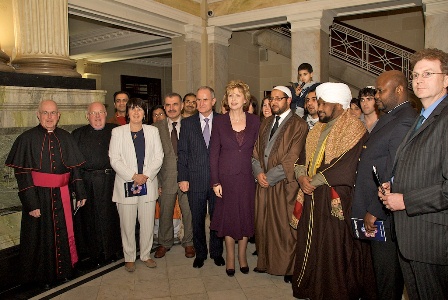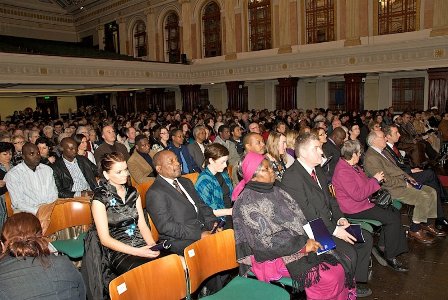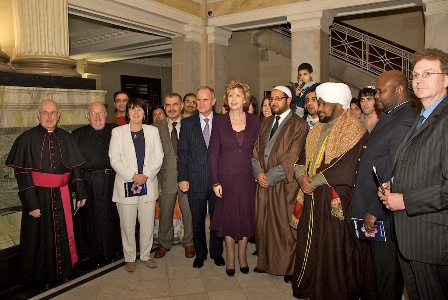CHAPTER 3:
DIFFERENT KINDS OF DIALOGUE
Dialogue is a means of building the openness, understanding and trust needed for Christians and Muslims to live and cooperate with each other despite their differences. It can take place in different ways and on different levels. These are briefly described here:
THEOLOGICAL DIALOGUE OR DISCOURSE:This takes place on academic or official levels between experts, theologians and religious leaders. This kind of dialogue helps to clarify issues, to create greater understanding and remove prejudices. By establishing links and relationships between leaders, such dialogue can facilitate and enable practical cooperation and action on the other levels described below. The aim of this exchange is not to reach a common belief, but rather to clarify what each partner believes, to appreciate each other’s spiritual values and to have a better understanding of differences.
Dialogue on this level has been happening for m any years in places around the world, and has helped to increase understanding and cooperation. Unfortunately much of the good has been undone by the polarisation of Muslims and Christians taking place due to fanaticism, violence and socio-political unrest. More dialogue, not less, is needed to counter these negative trends. Here in Ireland dialogue between religious leaders is only just beginning and is a welcome development. The engagement of religious leaders in the dialogue process gives both encouragement and an example for people of both faiths to follow.
| PRAYER OF ST FRANCIS Lord, make me an instrument of your peace. Where there is hatred, let me sow love; where there is injury, pardon; where there is doubt, faith; where there is despair, hope; where there is darkness, light; and where there is sadness, joy. O Divine Master, grant that I may not so much |
THE DIALOGUE OF RELIGIOUS EXPERIENCE:This involves interfaith prayer and also occasions when spirituality and religious texts are studied by members of both faiths. This kind of dialogue also requires a level of expertise. Great care needs to be taken when preparing a Muslim Christian prayer service (or any interfaith event). It is important that there is a real reason or need for the shared prayer: for example, when something significant happensn local communities calling for people to come together in prayer.
It is difficult to find forms of joint prayer that respect the sensibilities of both Muslims and Christians. One Prayer that is acceptable and often used is the Prayer of St Francis. Interfaith Prayer events often take the form of each participant listening respectfully to the prayer of the other. Silent reflection is also a powerful symbol.
When preparing an interfaith prayer event the guiding principle should be that of respecting the beliefs of the other. All preparation should be done jointly with texts, words, symbols, actions and music discussed and agreed. Having a practice “dry run” of the planned event is a good idea as it will give all those organising the event a clear idea of what will happen, thus avoiding unforeseen and avoidable causes of offence or embarrassment. Once a format and Order of Service has been agreed, stick to it.
Examples of Interfaith Prayer Services and guidelines for preparing them can be found on the internet. Click here for information about a Cois Tine interfaith event and here for an Australian website.
See also http://assembly.uca.org.au/rof/religious-gatherings
|
“Without dialogue between people of faith, the vacuum in communication and understanding can quickly and easily be filled by gossip, mistrust, prejudice, bigotry and racism. Bigotry is fed by fear and ignorance. Without dialogue and mutual respect, extremism and hatred can grow. A proper approach will embrace learning about what adherents of a particular world faith say about their own faith rather than relying on what is alleged by others on their behalf. When interfaith co-operation works well, all of our lives are enriched. The knowledge and understanding of others enhances our lives, helps us to understand difference, gives substance to our belief and points us towards lives rooted and grounded in love”. GUIDELINES FOR INTERFAITH EVENTS AND DIALOGUE. Committee for Christian Unity and the Bishops of the Church of Ireland p 31 |
THE DIALOGUE OF COMMON ACTION:Christians and Muslims can work together to promote and preserve peace, liberty, social justice and moral values. Both faiths place a strong emphasis on justice and peace and on respect for human dignity. Both religions see human being s as stewards of God’s creation, entrusted with the care of the earth. We share common concern for humanitarian values, the environment and for the proper use of the world’s resources. We should, therefore, collaborate in addressing social concerns based on these common religious motives and values. On a local level, we can work together to build better communities, and to provide voluntary services and facilities. Issues of social concern such as housing, drug abuse, street violence, unemployment, refugees and education are areas where Muslims and Christians can cooperate.
| “Civilized people solve their problems through dialogue.” FETHULLAH GULEN A Turkish Muslim scholar and an advocate for dialogue |
THE DIALOGUE OF LIFE: This is where people strive to live in an open and neighbourly spirit, the ordinary everydaybusiness of getting on with each other, of being good neighbours and living in peace and harmony. This can be hard enough for a people of a common background but, where religious and cultural differences exist, more effort is needed. Note, the word “strive” is used above. There will be a need to make an effort to reach out, to understand, to break down our own prejudices and to overcome the barriers, stereotypes and suspicions that are in us all. This will not be easy and it will require perseverance. We will have to be patient, be willing to listen and to accept that people are different, or have a world-view different from our own. To live in peace as our faith requires demands this effort.
We can all engage in the Dialogue of Life and the Dialogue of Common Action. These require no specialexpertise, but they do require an openness to interact with the other in a spirit of respect and cooperation. These kinds of dialogue are important because they have a direct bearing on our daily lives and on how Muslims and Christians live together in the now multicultural and multi-religious Ireland.

The Dialogue of Life and of Common Action can take place in both formal and informal settings. Informally,involvement in residents’ associations, parent-teacher meetings, youth groups and sports clubs. It can happen between individuals, neighbours, friends and people we work with. All of these are occasions where mutual understanding and an appreciation of the other can grow. Faith may not even be discussed in these situations, but it can be witnessed to through action, respect and mutual support. Individually our involvement in the Dialogue of Life is very much about our attitude to each other and our disposition towards engaging with each other.
To move on to Chapter 4 – Engaging in Dialogue click here

